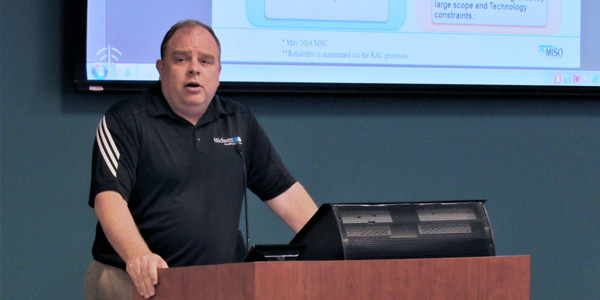By Amanda Durish Cook
CARMEL, Ind. — MISO is testing the waters for creating a multiday energy market that would keep generators with long start-up times switched on for more than one day.
The effort has strong backing from stakeholders, who last year assigned the introduction of multiday financial commitments a “high priority” in the RTO’s Market Roadmap. (See MISO Projects Reordered Following Stakeholder Frustration.)
MISO says the change will result in more cost-efficient unit cycling and more diversity in the selection of resources called up for commitment. Market participants have said that relying on the routine cycling of baseload units can lead to inefficient unit commitment and higher maintenance and capital costs when a slow-moving unit is repeatedly switched on and off to conform to a next-day schedule.
RTO staff will begin analyzing historical market data in order to assess the costs and benefits of committing units over multiple days, MISO Markets System Analyst Chuck Hansen said at a May 11 Market Subcommittee meeting. The existing day-ahead market is not designed to accommodate units with long lead times or high start-up costs, he said.
“For units with a long lead time, the day-ahead market is going to think that it’s not profitable to start that unit,” he said, adding that the day-ahead market does not typically commit units to serve reliability needs.
But MISO could stretch its market model to notify units days ahead of time when they will be needed.
Still, a multiday market raises the question of who pays for the risk of overcommitting resources. Hansen said that risk could either be assigned to market participants, or MISO could take on the risk with the creation of multiday revenue sufficiency guarantees, which could result in increased uplift payments. Stakeholders could even agree to eliminate the day-ahead market in favor of a multiday market, although it would be a huge undertaking, he said.
Wind units — forecasted only a day out — and forced outages could complicate how slow-response units are scheduled. Hansen also told stakeholders that the “potential to improve unit commitments may be limited” compared to self-scheduling. Resources with high production costs will almost never be committed, even in a multiday commitment market, Hansen said. On the flip side, resources with low production costs can self-commit and remain running.
A multiday market could be useful for even faster-ramping gas-fired units, which must complete their weekend gas reservations on Fridays, Northern Indiana Public Service Co.’s Bill SeDoris said.
MISO market engineer Shu Xu said the RTO would not include the elimination of the day-ahead market in its cost-benefit analysis because the scenario is impossible to test with current software.
That comment prompted DTE Energy’s Nick Griffin to ask if MISO’s impending market system overhaul would allow a multiday market to completely replace a day-ahead market. Dhiman Chatterjee, MISO’s senior manager of market analysis, responded that, given the target deadline for completing a cost-benefit analysis, the RTO could not wait on the development of an entirely new market software platform just to test for such a far-fetched scenario.
MISO hopes to complete its analysis late this year and produce a conceptual design for a new multiday financial commitment market during the first half of 2018.





